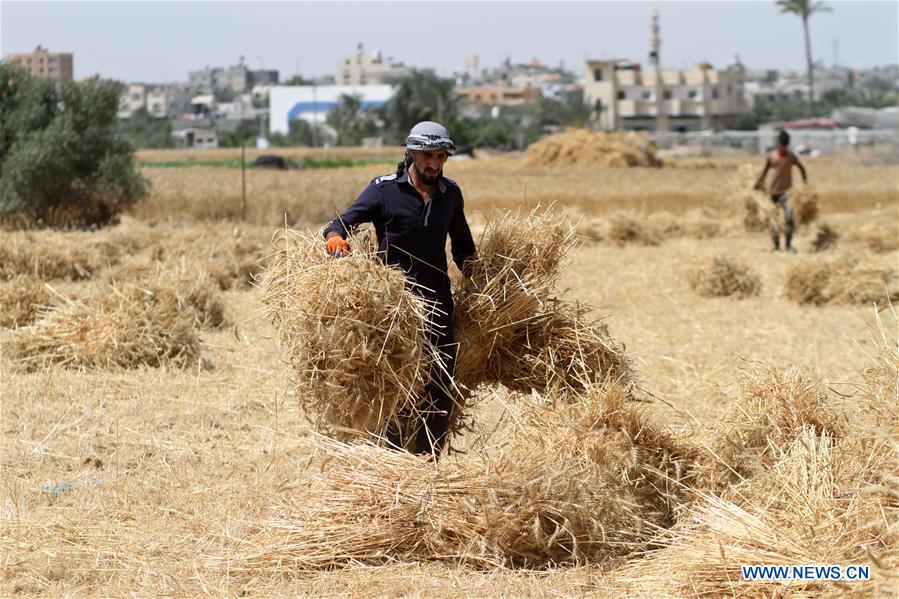
A Palestinian young man harvests wheat in a field near the border with Israel in the southern Gaza Strip city of Khan Younis, June 4, 2020. (Photo by Rizek Abdeljawad/Xinhua)
by Sanaa Kamal
GAZA, June 4 (Xinhua) -- Wesam Abu Musabeh, a 26-year-old young man, cultivates lands along Gaza's eastern border with Israel to make a living, with 44 unemployed graduates from the Gaza Strip.
"The eastern border between Gaza and Israel has changed my life," Abu Musabeh from Khan Younis city in the south of the coastal enclave told Xinhua.
Over two years, Abu Musabeh used to take part in the weekly protests joined by thousands of Palestinians who lost hope in life.
The protestors demanded Israel to end its blockade that has been imposing against them since 2007 following Hamas' seizure of power, causing harsh living conditions.
After few weeks of demonstrations, Israeli soldiers stationed on the border shot Abu Musabeh twice, leaving him disabled on the left foot.
For Abu Musabeh, who was his 10-member family's only breadwinner, the injury was a severe blow. The young man has tried to find a job on a number of occasions but has repeatedly failed.
"The situation went from worse to worst," Abu Musabeh said, adding that "there were no jobs, no security, no food and no hope for a better future."
Pushed into poverty, Abu Musabeh was desperately looking for a solution.
Together with other 44 unemployed graduates, he went again to the border areas to cultivate lands.
Alaa Abu Tair, who has been unemployed since he graduated in 2009, was one of the young people who joined Abu Musabeh.
"It is not what I had dreamt of. I spent some 12,000 U.S. dollars on education, but I had no job after completing my studies," the 31-year-old father of three told Xinhua.
"Now, we work eight hours a day to earn 15 dollars only, but we simply don't have any other choice," the man said.
However, cultivating the lands has proven to be difficult as the young men often face the shooting of Israeli soldiers if they approach the fence.
Israel imposed a security buffer zone of 300 meters along the Gaza Strip's eastern border, making agricultural areas challenging to approach.
Israel claims that the move was necessary to prevent Palestinian armed factions from launching attacks from the Gaza Strip into Israel's southern communities.
However, Palestinians believe that it is just another means that tightens the loss of Gazans.
Mohammed Abu Lahia, from the town of al-Qarara, is another young man who takes the risk by cultivating the lands close to the border.
He walks about five km a day to reach his team before heading towards the eastern areas where they work under the hot summer sun.
Graduating from the College of Sharia and Fundamentals of Religion, Abu Lahia has been unemployed since 2017, struggling to feed his family.
"There is an army of unemployed graduates who had lost any hope," Abu Lahia said. "Since there is a lack of justice, it is us, the ordinary Palestinians, who end up paying the price," he complained.
Nevertheless, the young people who joined in the cultivation of lands believed that the Palestinian youths in the impoverished coastal enclave can overcome the worst circumstances to earn a living and feed their families.
The unemployment in Gaza has reached unprecedented heights after Hamas seized power in 2007 and Israel's subsequent decision to impose a full blockade of the coastal enclave.
According to estimates, more than 80 percent of Gazans are unemployed, of whom many are educated young people.
A local Gaza-based committee resisting the Israeli blockade has warned in January that Israel's embargo has led to a severe humanitarian deterioration in all aspects of life in the Gaza Strip.



